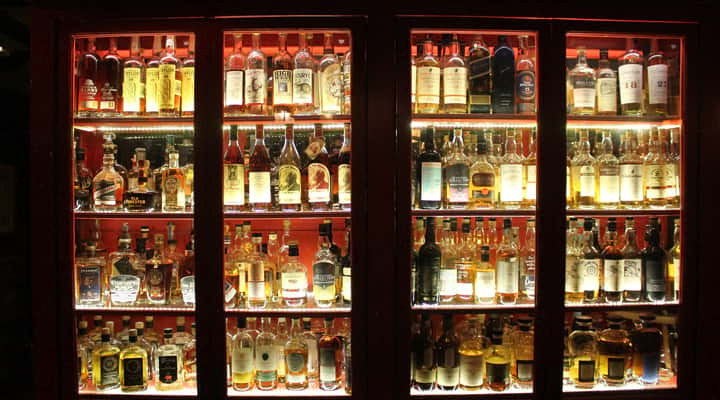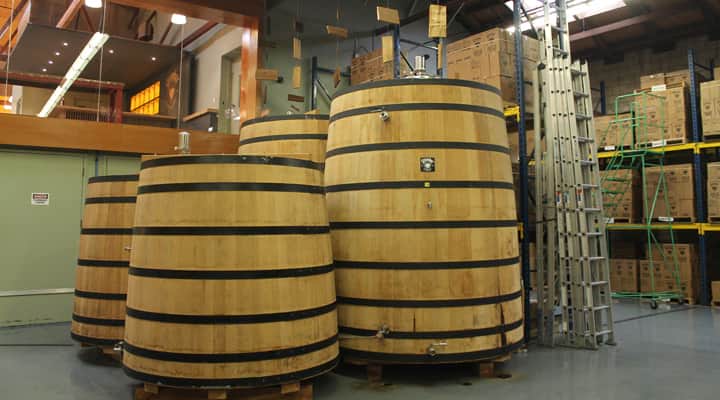
How to Store Whiskey After Opening
Mar 31, 2023 / Matthew Sanderson
The Tam O’Shanter, one of Los Angeles’ oldest restaurants, has about 400 bottles of whiskey in use on any given night and another 600 to 700 bottles in storage, and its brand flavors must always stay in the best tasting condition. From similarly popular Scottish pubs and spirits-centric restaurants around the world, to your assembled mini bar in your new home, let us guide you in how to store whiskey.
Top shelf spirits, especially whiskey, require protection for such an investment. So how long can you store whiskey? Unopened, properly stored whiskeys will last several years, yet once opened, oxygen is the top culprit to rob whiskey of its original flavor. Even though the alcohol will not spoil as fast as wine or skunk like beer after opening, whiskey is still vulnerable to losing its flavor if it is not stored properly.
Take advantage of an opportunity with good whiskey, says Melkon Khosrovian, co-founder of Greenbar Distillery, one of the only whiskey producers in the LA area, and store it properly. If you are thinking of applying these storage techniques below to some store-brand whiskey you bought from the supermarket, think again. You should probably just drink the cheaper stuff after opening.

Secure Bottle Tops for Optimal Whiskey Storage
Back at the Tam O’Shanter, staring at its beautiful glass display case near the entrance at the start of a Friday night dinner rush, General Manager John Lindquist meticulously positions every bottle so it displays in the light just right.
Since oxygen can make whiskey go stale, Lindquist and others also spend their days keeping air out of these vessels, and their work can reach obsessive levels. Bartenders and collectors take the extra time to make sure lids are tight and also can work to keep corks moist for a tighter seal.
It’s an important topic these days for some since the market share of American whiskey is up 8.1 percent year over year, according to the Distilled Spirits Council, with millennials helping popularize the liquor and cocktail culture.
The popularity is one reason why securing opened whiskey by tightening its cork top is one of the most important tasks for bartenders at the Tam O’Shanter, Lindquist said. Everyone on the team there knows that corks cannot be too dry or overly wet, he said.
“What we do with a bottle we don’t use often is rotate it down, make sure the cap is closed and keep the cork moist every few days,”; he said.
If you lose the seal on a cap, the whiskey will start to evaporate.
“You don’t want your whiskey shooting up in the sky,”; Lindquist added.
Distillery owner Khosrovian stores his whiskey bottles upright but does flip the bottle upside down occasionally to keep them from getting too brittle and letting in air. He also combats air by moving leftovers to a smaller corked bottle, with less air that can cause damage.
He’s learned the hard way that oxygen makes the pours increasingly disappointing, muting the whiskey’s flavor over time. And even with his best efforts, there is a deadline to drinking it all.
“Once you open a bottle, you’ve got a good two to three months,’ Khosrovian said. “You’re not saving it for the next generation. As more oxygen gets into the bottle, the whiskey will begin to age rapidly and lose its vibrant bouquet and distinct flavors.”;
If you want to model the dapper characters from “Mad Men”; and add fancy glass or crystal decanters to your new home mini bar, go ahead, especially if you plan to drink that expensive opened bottle of whiskey soon. However, if that nice whiskey will only be used occasionally, don’t bother.
“Decanters let in lots of air, which will just dull out the spirit inside,”; Khosrovian said.

Keep Stored Whiskey in Cool, Dark Places
The key to storing whiskey well is to also keep it cool, the liquid we mean. Keep bottles away from light and in a temperate environment, says Khosrovian.
“This will keep your dram as delicious as the day you bought it,”; he said.
If your house does not have a cellar or basement, find a closet in the middle of your house where it is cooler and less humid to store your whiskey. At Lindquist’s restaurant, he monitors humidity levels of his hundreds of bottles. Labels will also begin to mildew if it is too humid.
“You want a humid environment for wine, but not for whiskey,”; Lindquist said.

Alejandro Hernandez, a bartender at the popular Mohawk Bend bar and restaurant in LA’s Echo Park neighborhood, agrees that it is best to store your whiskey at room temperature, and never freeze it, as this takes away from a flavorful experience.
“Having said this, I personally think the best method of storing whiskey is to store it in your belly,”; he said. “Cheers.”;






